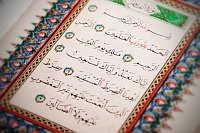 People who have not tasted the delight of belief in their hearts will deny that Allah (God) exists by all kinds of reasoning. One of the reasoning offered is by saying that there is no God because there is too much evil and bad things happening in this world. They will even question our own mishaps in order to strengthen their claim. To tell the truth, there was also a time where I myself was in their position. But after sometime, I eventually gave up and submitted (and eventually felt content due to the knowledge that Allah gave me, Alhamdulillah). I believe that if one is truly sincere in searching for the truth, and puts the best effort in it, by the will of Allah, he/she will be guided to it.
People who have not tasted the delight of belief in their hearts will deny that Allah (God) exists by all kinds of reasoning. One of the reasoning offered is by saying that there is no God because there is too much evil and bad things happening in this world. They will even question our own mishaps in order to strengthen their claim. To tell the truth, there was also a time where I myself was in their position. But after sometime, I eventually gave up and submitted (and eventually felt content due to the knowledge that Allah gave me, Alhamdulillah). I believe that if one is truly sincere in searching for the truth, and puts the best effort in it, by the will of Allah, he/she will be guided to it.There are several points that we need to take into consideration when we look at the evil/bad things that happen around us (and all over the world).
The first point is that there is no such thing as pure evil or pure bad. Through something that we conceive as evil/bad, comes many things that we consider good. Through pain and suffering we can appreciate the pleasures that we are blessed with, and in turn, learn to help others in experiencing it. Through sickness we learn to appreciate health. Through our mishaps we learn to be patient. Through hardship we learn to grow wiser. And the list goes on and on...
As said by the beloved Messenger of Allah, "If Allah wants to do good to somebody, He afflicts him with trials." All we need to do is be patient, ponder on what has happened, and stay optimistic.
The second point is that humans use their finite (limited) knowledge and wisdom to determine whether something is good or bad. And in our ignorance, we conclude that what we perceive is what is correct. However, the truth is, whatever we think is bad, may possibly be a good thing. No one truly knows the true nature of things that happen but The All Wise, The One Who possesses infinite knowledge and wisdom.
Allah has addressed about this in the Qur'an (Al Baqarah aayah/verse 216)

"Holy fighting in Allah's cause is ordained for you, even though it be hateful to you; but it may well be that you hate a thing the while it is good for you, and it may well be that you love a thing the while it is bad for you: and God knows, whereas you do not know."
For a Muslim, the third and last point that needs pondering is that there is an eternal life after this short life of ours. The average life expectancy (death age) of a person in developed countries is only around 75-85 (accompanied with all the sickness and pain of old age), and many die at even much younger ages. What is 80 years compared to the earth's age, more else “eternity”? The Messenger of Allah says that suffering which is handled with full of patience and optimism will be compensated in the hereafter. No Muslim is affected with harm but that Allah expiates his sins because of it.
If we are able to be conscious about those three points, by Allah’s will, we will be given contentment and tranquility in our hearts, and consequently have more trust in Allah even after calamity or something bad strikes.
To me, all the suffering, evil and the bad things that happen in this world further clarifies and strengthens my faith in the existence of The All Wise Creator, and that we were created in different conditions so that we can help and get to know each other by and according to His will. I hope we can open up our hearts and be given the wisdom to see the good in everything that we experience, no matter how bad they are and act accordingly with the best of actions.
Keywords: Al Baqarah 216 life God Allah atheism











